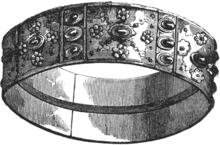Sometimes it helps to meditate on what is good by looking at the opposite, at least for those of us who only have “intimations of deprivation” and have not yet found our true center. This kind of “cautionary tale” meditation or meditating “by negative example” is very easy in Western … Continue reading
Category Archives: Chivalry
Middle Earth Once More
“By way of such aspects, we see—it is clear—in the Middle Ages an awakening of the true forces already acting in Nordic-Aryan Romanity, of its true solarity, propitiated from such a resurgence or rebirth from a new contribution of Aryan blood…” Gornahoor translating Evola, on Cesaro Indeed, a tremendously sophisticated … Continue reading
Recapitulation

The doctrine of Recapitulation can be deduced from that of karma and sexual union. Continue reading
The Duty of the Wise Man

The fundamental attitude of the Courtier was to do everything with a type of style and grace done with a certain nonchalance that made the difficult seem effortless. Castiglione coined a new word for this: Sprezzatura. Continue reading
Good Government
This is a thought experiment based on Rosenstock-Huessy‘s comments in I Am an Impure Thinker. Summarized, they are to the effect that the modern world is a place that likes to “divide time, & conquer space”. Hence our obsession with speed and time, as if we were racing against death. … Continue reading
Action and Contemplation in Dante’s Divine Comedy
Titus Burckhardt, in his essay “Because Dante Was Right,” argues that one of the main themes of the Commedia is “the reciprocal relationship between knowledge and will.” Knowledge of the eternal truths is potentially present in the human spirit or intellect, but its unfolding is directly conditioned by the will, … Continue reading
The Order of the Iron Crown

The Holy Roman Emperor Charlemagne used the Crown at his coronation ceremony in Lombardy Continue reading
Nine worthies: Champions of Chivalry
The Worthies are archetypal and the symmetry of the scheme reflects the Medieval view of history and destiny of European man. The Old Law prepared the way for the New. The Pagan law created the Pax Romana that allowed the spread of the New Law. Continue reading
The Symbolism of the Horse

Within a single organization, a kind of double hierarchy can exist, especially when the apparent leaders are themselves unaware of any link to a spiritual center. In such cases there may exist beside the visible hierarchy made up by those apparent leaders, an invisible hierarchy of which the members may not fulfil any ‘official’ function but who, by their presence alone, nonetheless assure an effective liaison with this center. In the more exterior organizations these representatives of the spiritual centers obviously need not reveal themselves as such Continue reading
Random thoughts on Chivalry

Classical ethics, classical jurisprudence and classical philosophy, though by no means irreconcilable with Christian thought and exercising a powerful influence upon it, belonged to a pre-Christian tradition. Chivalry was thus reminded, forcefully, of the separation of the origins of its institutions from those of the priesthood, and of the original independence of its function — within the broad framework of divine providence — from the priestly one. Continue reading